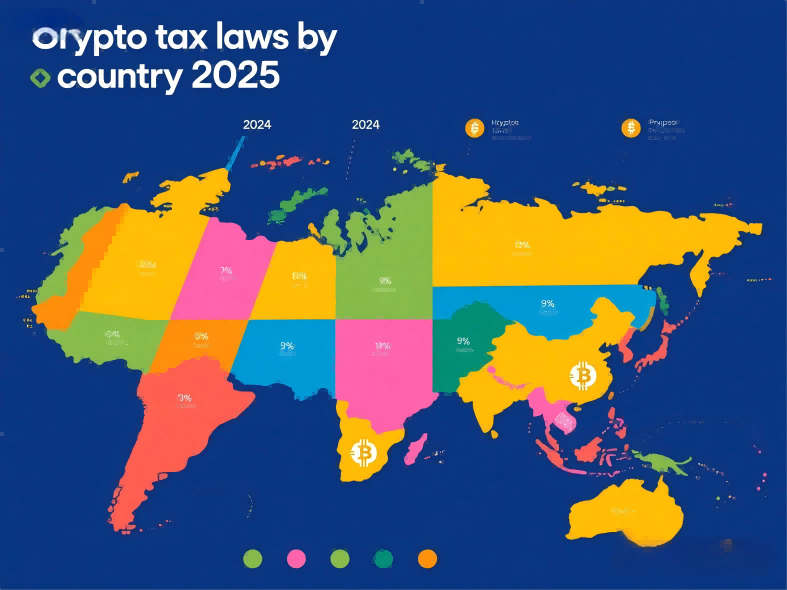Crypto's gone mainstream, and so have the tax laws around it. Whether you're flipping meme coins for fun, yield farming in DeFi protocols, or just HODLing some Bitcoin in a cold wallet, your government likely wants a piece of the action. The tax treatment of crypto assets in 2025 isn’t just a niche concern—it’s a global talking point, with countries tightening regulations, improving tracking systems, and stepping up enforcement.
As a trader, investor, or crypto-curious newcomer, understanding how different countries treat your crypto gains (or losses) could save you a ton of stress—and money. Here's how the crypto tax landscape is shaping up across borders in 2025, and what it means for your next trade.

If you're a U.S. resident, crypto remains classified as property by the IRS. That means every time you sell, trade, or use crypto, it’s a taxable event. Buying coffee with ETH? That’s a capital gain or loss. Swapping tokens on a DEX? Also taxable.
Short-term gains (assets held less than a year) are taxed at your ordinary income rate, while long-term gains get more favorable rates. In 2025, the IRS has rolled out more detailed guidance on staking and DeFi income—treating staking rewards and airdrops as taxable income the moment you receive them, even if you haven’t sold.
Pro tip: Use tools like Koinly, CoinTracker, or TaxBit to track your trades automatically.
The CRA treats crypto as a commodity, which means bartering rules apply. If you're trading one coin for another or buying goods with BTC, that’s a disposition—and it could trigger a gain or loss.
Capital gains tax applies to 50% of the gain, but if you're actively trading or operating like a business, your entire profit could be counted as business income (fully taxable). In 2025, Canada has begun tightening rules around centralized exchanges and requiring more detailed user reporting.
Translation: The tax man is watching, even if you’re just trading memecoins in your basement.
The HMRC has published fairly detailed guidance on crypto since the early days. In 2025, the UK continues to treat most crypto activity as capital gains, but frequent traders may fall under income tax rules.
One update: if you're earning tokens through DeFi protocols or yield farming, that income may now be taxed at the time of receipt, not just upon sale. The UK also rolled out a requirement for major exchanges to report user transactions directly to the tax authorities.
If you're in the UK, keeping solid records—like wallet addresses, trade history, and dates—isn’t optional. It's essential.
Germany remains one of the more favorable places for long-term crypto holders. As of 2025, if you hold your crypto for more than 12 months, your gains are completely tax-free. That includes Bitcoin, ETH, and even NFTs.
However, if you sell within a year, capital gains are taxed. And if you’re engaging in staking or lending, new rules now reset that 12-month holding clock—so rewards from DeFi platforms may not qualify for tax-free treatment anymore.
Still, for patient HODLers, Germany is one of the most crypto-friendly places to live.
In Australia, crypto is also viewed as property, and the ATO expects you to declare every taxable event. Whether you’re selling, trading, or using crypto, it could trigger a capital gain or loss.
As of 2025, the ATO has enhanced its data-matching capabilities, pulling info from exchanges and blockchain analytics providers to flag non-compliant users. They’re also treating NFT sales and DeFi income with stricter scrutiny.
Holding crypto for more than 12 months still gives you a 50% CGT discount—so long as you document everything properly.
Both the UAE and Singapore have maintained their positions as crypto tax havens into 2025. There's no capital gains tax on crypto for individuals in these countries, making them attractive for crypto traders, high-frequency firms, and even DAOs.
However, there’s growing international pressure on these nations to join global frameworks like the OECD’s crypto reporting standards. While you may not owe taxes locally, your home country might still expect you to report if you're a citizen or tax resident there.
The OECD’s Crypto-Asset Reporting Framework (CARF) kicks in globally in 2025, requiring exchanges to share detailed user information across borders. Think of it as the FATCA of crypto. If you thought offshore wallets would hide you from the IRS, CRA, or HMRC—you might want to rethink that.
This system means even if you use an exchange based in another country, your home government might still get that data. Transparency is the name of the game.
Crypto trading in 2025 is no longer a free-for-all. Global tax laws are more mature, surveillance is tighter, and ignorance isn't a defense. Whether you’re a casual buyer, a DeFi yield chaser, or an NFT flipper, understanding your local tax rules is as important as knowing market trends.
"Don't let Uncle Sam (or his international cousins) catch you off guard. Trade smart. File smarter."
Consider consulting a crypto-savvy accountant or using a crypto tax platform to stay compliant and avoid headaches when tax season rolls around. Because in crypto, it's not just how much you make—but how much you get to keep.
询问 ChatGPT
Spot trading is straightforward: you buy an asset like Bitcoin, Tesla stock, or gold, and you profit if the price goes up
Read MoreTrading has always carried an air of possibility. The idea of turning a well-timed decision into a life-changing profit a
Read MoreStart your CFD trading
Your All in One Trading APP PFD